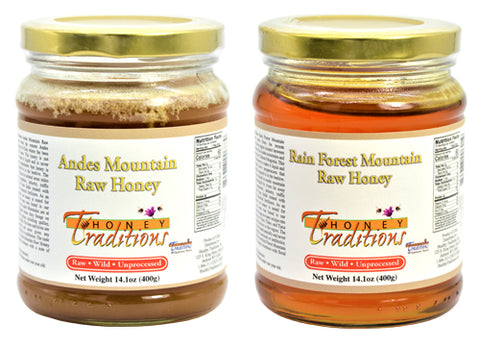
Andes Mountain Raw Honey - 14 oz. Glass Jar
Healthy Traditions Andes Mountain Raw Honey comes from the remote Andes Mountain region of Chile where the bees roam in wild areas far away from dense population, industry, traffic congestion, and farm fields treated with pesticides and chemical fertilizers. The wild Andes Mountains are at the bees' disposal where they forage on many different pollens including raspberry, dandelion and blue grass. The taste profile of our Andes Mountain Raw Honey is pronounced sweetness with a note of caramel.
Chilean Raw Honey

We Searched the World to Find the Highest Quality Honey Untainted by Herbicides and Pesticides!
For years Healthy Traditions was the exclusive distributor of a wild, raw honey from the remote frontiers of Canada, that consistently tested free from the presence of the herbicide Glyphosate.
But during the most recent harvest of this premium Canadian honey, we could not get any of the batches to test clean of this pervasive herbicide that has contaminated so much of the food supplies in the U.S. and North America.
So we searched the world looking for a wild honey, one where the bees are in their natural environment and where they are not used to pollinate crops where honey is simply the by product, and where the bees would be far away from any type of commercial agriculture.
Healthy Traditions is now happy to introduce to you our Organic Raw Chilean Honeys that come from the Andes Mountain and Patagonia Rain Forest areas of Chile!

Healthy Traditions is the exclusive source of these premium honeys in the U.S. In Europe, these honeys have won several awards for being some of the best honeys in the world!
Most commercial honeys available on the market today come from bee farms, where the bees are controlled within a certain area and get their pollen from usually only one kind of flower.
Many of the plants that produce these flowers (clover, orange blossom, almond blossom etc.) are grown with pesticides and fertilizers as well.
The owners of the bee hives make most of their income from renting out their bees to pollinate commercial agricultural products, and the honey they produce is simply the by product, and this would represent probably more than 99% of the honeys you can buy in stores, including "local" honey.
In addition, almost all honeys on the market are pasteurized in high heat and filtered, removing many of the beneficial nutrients and enzymes.
Healthy Traditions Organic Raw Chilean Honeys have not been subjected to the heat of processing, only warmed enough to flow (same temperatures the honey would see inside the hive).
This honey contains live yeast and enzymes, because it has not been processed. It also contains pollen because it has not been filtered—merely screened.
Truly raw honeys do not deteriorate with age, but like fine wines, continue to age and develop into more complex tastes.

Two Regions, 2 Different Taste Profiles

Healthy Traditions Andes Mountain Raw Honey comes from the remote Andes Mountain region of Chile where the bees roam in wild areas far away from dense population, industry, traffic congestion, and farm fields treated with pesticides and chemical fertilizers.
The wild Andes Mountains are at the bees' disposal where they forage on many different pollens including raspberry, dandelion and blue grass.
The taste profile of our Andes Mountain Raw Honey is pronounced sweetness with a note of caramel.

Healthy Traditions Rain Forest Mountain Honey comes from the remote mountain rain forest region located between the southern part of the Andes Mountains and the beginning of the Chilean Patagonia.
The bee hives are located in exotic mountain rain forests surrounded by rivers far away from dense population, industry, traffic congestion, and farm fields treated with pesticides and chemical fertilizers.
The bees forage on many unique rain forest blooms such as Ulmo, Tineo and Tiaca trees, which are exclusive to the region.
The taste profile of our Rain Forest Mountain Honey is intense sweetness with floral notes.
Both honeys share in common that the bees and hives are treated naturally and are never given any synthetic chemicals or antibiotics.
Both honeys have also been tested for the herbicide Glyphosate, as well as many other toxins such as antibiotics, and none were detected in either sample. This is very clean, untainted honey!

Is Local Honey Always Best?
Find out if this belief is true or not.
Do not feed to infants under 1 year of age
Related Products

The New Child Abuse Pediatrician: Doctors become Prosecutors eBook

Estate-bottled Chilean Extra Virgin Olive Oil - 33.8 oz 1 Liter

Whole Grain Einkorn Flour Pancake Mix – 12 oz.

Coconut Smoothie Recipes eBook - 53 Recipes


